Usually, an interest in the history of their appearance in children appears at the age of “why”, that is, about 3-4 years. Up to this age, even considering his infant photographs, the child usually does not ask himself the question “Where did I come from?” This interest is completely normal, but for a long time this topic was hushed up, and the children were “dismissed” by all known cliches: “found in cabbage”, “the stork brought”.
Modern psychologists claim that fictional stories about the appearance of a child in the family (“Found in cabbage”, “the stork brought”) greatly undermine the trust of the baby in the parents, because once the child still finds out the truth and will be upset by parental cunning.
Explaining to the child where the children come from, one must speak truthfully, but this truth must be adapted to the age of the inquisitive man. The older the child, the more questions about “this” he has. Parents should prepare for such questions in advance so that they do not take mom or dad by surprise and do not make the child doubt the sincerity of adults.
How to talk with a child 3-4 years old
At the age of about 3 years, the child begins to feel like a person and for the first time identifies himself with representatives of one of the sexes - boys or girls. In this regard, there is interest in the structure of the body, and children notice not only the differences between boys and girls, but also pay attention to the characteristics of the body of adults. In this regard, precursors of questions about childbearing may be questions regarding the purpose of the genitals, their differences (if, for example, a child on the beach saw a baby of the opposite sex). Meeting with a pregnant woman can raise many questions, because an abdomen of outstanding size will not go unnoticed. Even more often, conversations about the birth of the world begin after the baby happens to see or get to know the baby closely. Some children may ask the direct question "Where did I come from?" No matter where the wind “blows” of children's interest, the task of the parents is to honestly and easily answer the child.
 At 3-4 years, you do not need to go into the physiological mechanisms of conception, gestation and childbirth. You can confine yourself to the story that dad and mom really love each other and really wanted a baby. As a sign of his love, dad gave his mother a magic seed that she wore in her tummy. The seed grew, and with it my mother’s tummy. From this seed in the tummy grew a baby. When he became cramped in his house, he asked to be born and was born. Together with the story, you can show the child photos from the family album, because many couples make a memorable photo shoot while the baby is waiting.
At 3-4 years, you do not need to go into the physiological mechanisms of conception, gestation and childbirth. You can confine yourself to the story that dad and mom really love each other and really wanted a baby. As a sign of his love, dad gave his mother a magic seed that she wore in her tummy. The seed grew, and with it my mother’s tummy. From this seed in the tummy grew a baby. When he became cramped in his house, he asked to be born and was born. Together with the story, you can show the child photos from the family album, because many couples make a memorable photo shoot while the baby is waiting.
When talking with the baby about his birth, it is important to emphasize that the baby was very expected, and that he was born as a result of great love.
We talk with a child 5-7 years old
In older preschool age, the previous explanations cease to satisfy the baby. The child grows up, begins to think more difficult, acquires a certain life experience, and he is already beginning to wonder how the seed got into the mother’s stomach, how the child came from there, and other things. In terms of psychological development, the age of 5-7 years is the time when the child masters the world of relationships and feelings, in this regard, at this age, he first opens for himself the world of adult relationships, including intimate ones, because it is not always possible to completely protect the child from explicit scenes on the Internet or on TV.
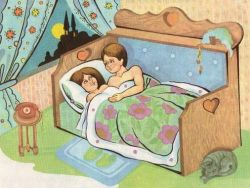 By and large, at the age of 5-7 years, parents will first have to talk about sex with their child. We need to talk about this topic in this way: sex is normal and natural, but only adults do it. That is, on the one hand, it is important not to form a taboo on this topic in children's consciousness, and on the other hand, to make it clear that intimate relationships are the prerogative of adults, they are not put up for public discussion and are not advertised.
By and large, at the age of 5-7 years, parents will first have to talk about sex with their child. We need to talk about this topic in this way: sex is normal and natural, but only adults do it. That is, on the one hand, it is important not to form a taboo on this topic in children's consciousness, and on the other hand, to make it clear that intimate relationships are the prerogative of adults, they are not put up for public discussion and are not advertised.
You can tell that when people love each other - they like to be together, touch each other, hug, kiss. It is in the process of such caresses that pregnancy occurs. Talk in detail about the birth process is also not worth it. We can say that a child is born in the hospital, with the help of doctors.
IPad app
There is a special iPad app that allows parents to explain to their child where their children come from. Using the application, you can quite simply and easily answer your baby questions.
(clickable) Developer Studiya 158 OOO Link http://studio158.pro/work/Where-do-babies-come-from.html
Conversation "about it" with a student of 7-10 years
We are talking about preteen children. Today they are still children, but they are about to turn from boys and girls into girls and boys. As a rule, at this age, children are already quite knowledgeable about sex and childbearing, but this knowledge is often very distorted.
The main task of parents in this period is to prepare their growing children for growing up and the changes that will happen to them in the near future. Girls definitely need to talk about menstruation, the appearance of hairs on the pubis and armpits, breast growth. For boys - about a change in the proportions of the figure, nocturnal emissions, "breaking" of the voice and the appearance of facial hair. Talking with a child is better for a parent of the same sex, that is, for moms - with girls, dads - with boys.
For parents, such conversations are a problem. Often, mothers and fathers are more embarrassed by children to talk about these topics. Perhaps it will be best if informing the child will occur as if between things. It is not worth solemnly reporting: “I need to talk with you,” sitting the child in front of him and giving a boring lecture. From time to time, under various pretexts, you can start conversations, talk about your growing experience, and ask about friends and girlfriends. It is also not worthwhile to overload the child with information and complex terms, it is better to give it out in a dosed manner, give the child time to comprehend and, possibly, formulate their questions.
An encyclopedia is a convenient option for parents: they give it to them and let them read it. It’s better not to let the process go by chance and if you don’t tell, then at least discuss what you read with the child.
How to talk with a teenager 11-16 years old
Maintaining a trusting relationship with a teenager is a whole art, because at this age the authority of adults is devalued.However, without trust, conversations on a sensitive topic are impossible.
Teenagers are actively interested in the opposite sex, fall in love, meet. In some ways they are still children, but physiologically they are ready to lead an "adult" life. " That is why in the first place there should be talk not about hygiene or changes in the body, but about family planning, conception, pregnancy, contraception.
As with preparation for adulthood, in conversations with adolescents, a free atmosphere, a state of dialogue, and not “dry” lectures are important. Talking “about it” is better on an equal footing, like an adult with an adult, calling a spade a spade and talking about real dangers. Speaking about relationships with the opposite sex and the possibility of having a baby, it is important to emphasize that the baby is, above all, a great responsibility, therefore it is better if he is born consciously, in marriage, when both are ready to create a family and share responsibilities .
Parents of adolescents are always anxious: what if the child begins sex early? Suddenly there will be an unwanted pregnancy or infection? Unfortunately, in some families the child’s sexual education comes down to “I know - I will kill”. Unfortunately, in this situation, parents have every chance just not to find out. That is why if a child shares something personal - you should not criticize, scold, condemn him.
The older the child, the more complex questions arise in his head. He wants to get an answer to each of them, and if not in his family, then on the street or on the Internet, these answers will be found. If for some reason the child does not ask questions and does not show interest in a sensitive topic, parents should take the initiative in their own hands and start conversations first. The better the child will be “armed” with information, the more he will be ready for adulthood.
We also read:
- Top 10 children's questions that perplex parents (and how to answer them). Part 1
- The child found you in the bedroom for an "interesting occupation." What to do and how to find the right words?
- Awkward kids questions - how to answer?
- Age of “Why” or 100 thousand “Why ..? And why..?"
Book selection
- Dumont Virginie Where did I come from? Sexual Encyclopedia for Children 5-8 Years
- Virginie D., Montagna C. Where do the children come from? Sexual Encyclopedia for children 8-11 years old
- “How I was born,” Katerina Janusz, Mervi Lindman. Age: 4-6 years
- “Where do the children come from?”, Doris Ruebel. Age: 4–7 years
- A Book of Love, Pernilla Stalfelt. Age: from 4 years old
- “The main miracle of the world”, George Yudin. Age: 6–10 years
- “Before You Were Born,” Jennifer Davis, Laura Cornell. Age: 2–4 years
- “The True Story of How A Baby Is Made,” Per Holm Knudsen. Age: 3-5 years
- “A Kid’s First Book About Sex,” Joanie Blank. Age: 7–11 years old
- “Mommy Laid an Egg: or, Where Do Babies Come From?”, Babette Cole. Age: 3-5 years
- “Where Did I Come From?”, Peter Mail. Age: 7–10 years old
Where the babies come from? Posted by Doris Ruebel
Best-seller
Children want to know everything:
- Where the babies come from?
- What is the difference between boys and girls?
- What does the baby do in the mother’s stomach?
- What happens during childbirth?
Video consultation
Voiced book for iPad
This is a voiced children's book created for the Kinderbook iPad app. In an accessible language for children and in a playful way, the authors describe the technical details of the relationship between a man and a woman, as a result of which children appear.
Cognitive cartoon where the children come from
If you do not want to talk about cabbage and storks, this informative cartoon will tell about the inner world of a person. Simple and affordable, the child learns how a new life is emerging, why children are like parents, and even a little about DNA and RNA.

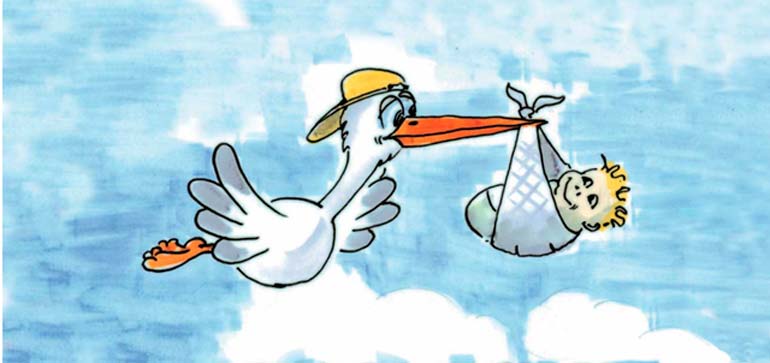
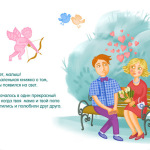
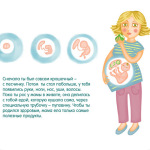
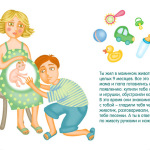
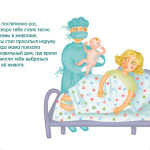
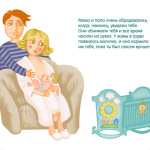
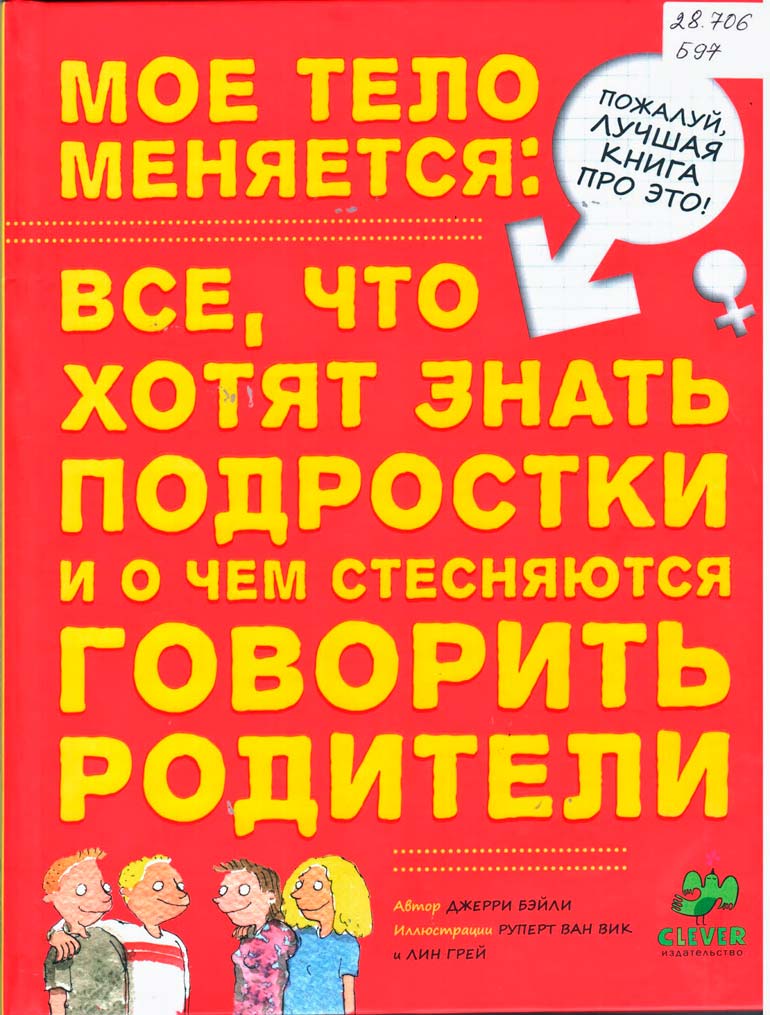

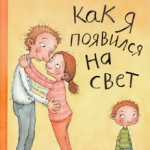


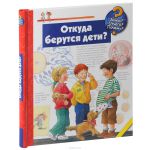

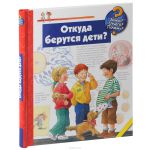
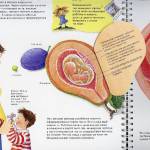

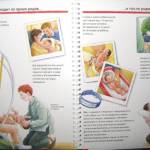








Yes, this question is very sensitive for many parents) I still have it ahead of my daughter there are two more. But my parents explained this matter to me with the help of a special book, I understood everything more or less.
A topic that every parent will comprehend, although no one explained this to me in his childhood. I study at the Faculty of Psychology and it is precisely such advice that they give us, as described in the article. For many, it will be very useful, you need to prepare for this and be sure to explain everything to your child.
This topic always seemed to me very ambiguous. If you lie, then until what time? Or do not bother with this - a grown child and so everything will know? The article liked the version about the seed that my father gave my mom. I was lucky with my daughter, she decided for herself something similar, and even tried to correct when she heard a different version.
We explained to the baby so. Dad had a seed, he gave it to mom, mom didn’t eat it, and the seed grew. She began to grow, pens, legs, etc. began to appear. That's how you grew up in your mother’s tummy. And when you became big, mom went to the hospital and aunt doctor took you out of the tummy. 😀